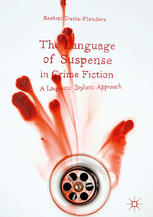

Most ebook files are in PDF format, so you can easily read them using various software such as Foxit Reader or directly on the Google Chrome browser.
Some ebook files are released by publishers in other formats such as .awz, .mobi, .epub, .fb2, etc. You may need to install specific software to read these formats on mobile/PC, such as Calibre.
Please read the tutorial at this link: https://ebookbell.com/faq
We offer FREE conversion to the popular formats you request; however, this may take some time. Therefore, right after payment, please email us, and we will try to provide the service as quickly as possible.
For some exceptional file formats or broken links (if any), please refrain from opening any disputes. Instead, email us first, and we will try to assist within a maximum of 6 hours.
EbookBell Team

0.0
0 reviewsThis book introduces readers to linguistic stylistic analysis and combines both literary and linguistic analysis to explore suspense in crime fiction. Employing critical linguistics, discourse analysis and functional grammar, it demonstrates that suspense in plot-based stories is created through non-linear, causative presentation of the narrative. The author investigates how plot sequence is manipulated to ensure the reader cannot resolve the order of events until the end of the tale. From two-dimensional circumstantial detection in mystery stories to three-dimensional re-evaluation of offender orientation, she uses a linguistic-based stylistic framework to analyse offender motive. She also employs a 'discourse-based' frame analysis to examine the plot structure of crime stories for micro context and set-up scenarios, demonstrating that it is the unravelling of these devices that creates the suspense in murder mysteries and thrillers alike. Finally, she shows how grammaticization of the offending-self reveals an embedded diegetic space in the offender engagement discourse, provoking an intellectual and affective response and reshaping our overall outlook of the crime in the story. This book will appeal to researchers and students from literary and non-literary backgrounds looking for theoretical and practical advice on the linguistic stylistic approach to reading texts.